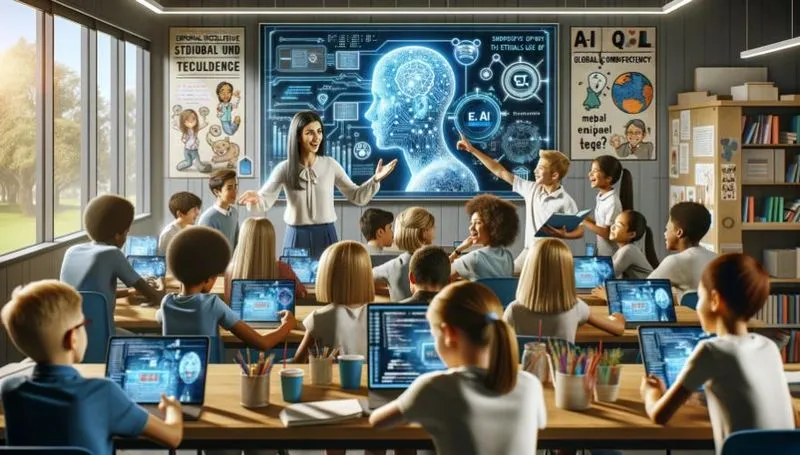In an innovative educational setting, the application of 21st-century learning design, rooted in the collaborative research of UNESCO, PISA, World Economic Forum, Microsoft, and Harvard, has been transforming the way students engage with the curriculum and develop essential skills for the future. This transformation is prominently visible in the school's approach to integrating Artificial Intelligence (AI) in its educational programs, particularly in the areas of emotional intelligence (EQ) and global competency.
At the forefront of this initiative is the Biology Department's ambitious deployment of a Skills Framework and Rubric. This framework has been meticulously woven into the curriculum across various year groups, culminating in a remarkable Interdisciplinary World Problems Project undertaken by Year 12 students. The success of this approach is exemplified by a student from the last cohort who, after engaging deeply with this program, secured a place to study Biology at Oxford University.
Parallel to this, the Year 8 cohort embarked on a pioneering tutorial program. This ongoing study emphasises the development of skills outlined in the framework, illustrating the program's dynamic and responsive nature. As these students progress to Year 9, the program continues to evolve, ensuring that the learning journey is as enriching as it is educational.
The highlight of the school’s AI application lies in the specialised program for Year 12 students. This program is distinct in its dual focus: teaching both the practical use and the ethical considerations of AI. It prepares students not just for the technological landscape of the future but also for the societal and workforce challenges that AI might present. This comprehensive program encompasses lessons on AI technology, problem-solving techniques, collaborative work, and personal wellbeing.
A pivotal moment in this educational journey was the mid-term assessment, marking the halfway point of the study. Here, students' EQ and global competency were measured using the robust framework provided by PISA. These insights have been instrumental in refining and adjusting the program, ensuring it remains aligned with the evolving needs of the students.
Looking ahead, the program is set to embrace an even broader perspective with the introduction of guest speakers from the Interdisciplinary School London for the Year 12 students. This initiative promises to deepen the students' understanding of AI and its multifaceted impact on society.
Throughout this journey, the challenges have been as instructive as the successes. Balancing this forward-thinking curriculum against the constraints of standard educational requirements has been a continuous process. Additionally, the program has had to navigate the complex landscape of social media's influence on students, striving to mitigate its potential negative impacts.
In summary, the school’s approach to integrating AI in education serves as a beacon for how technology and emotional intelligence can be harmoniously blended to prepare students for a future where AI is an integral part of society and employment.
The scenario in this case study is genuine and based upon real events and data, however its narration has been crafted by AI to uphold a standardised and clear format for readers.
Key Learning
The integration of AI and 21st-century learning in education has shown promising results in enhancing students' EQ and global competencies.
The holistic approach, balancing technological skills with emotional intelligence, prepares students effectively for future societal and employment challenges posed by AI advancements.
Risks
Challenges include balancing the innovative curriculum with standard educational requirements and addressing the potential negative impacts of social media.
Ongoing adaptation and evaluation are crucial to ensure the program's effectiveness in developing well-rounded individuals capable of thriving in an AI-influenced world.



